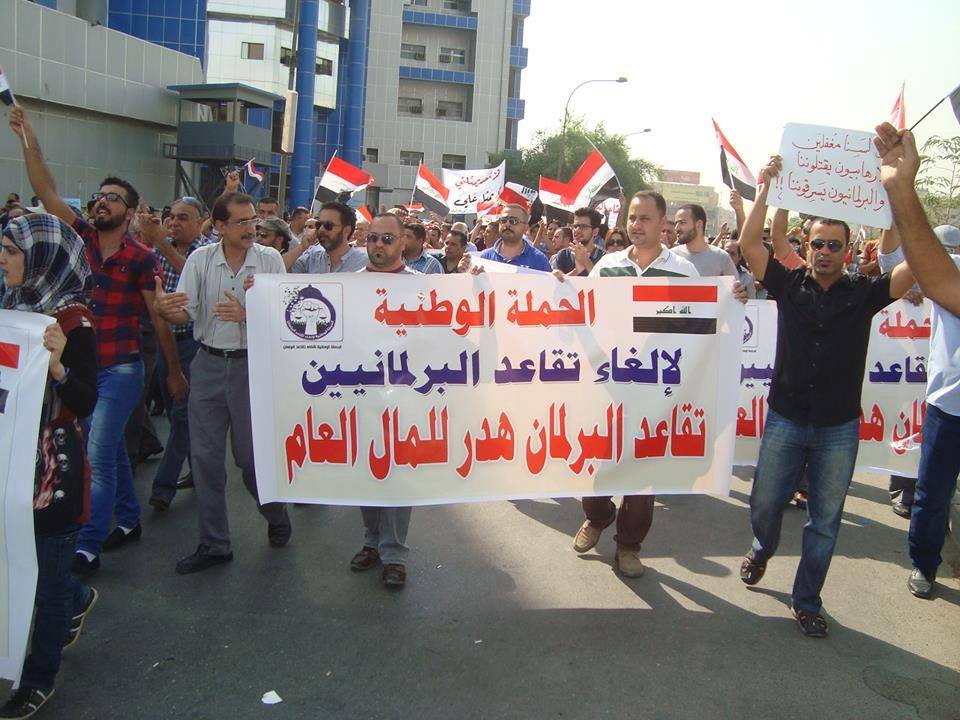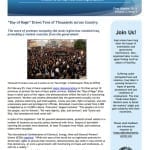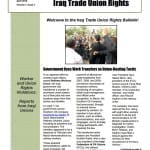
Iraq Trade Union Bulletin Archive
2011
 First Quarter
First Quarter
Second Quarter
Third Quarter
Fourth Quarter
2010
 First Quarter
First Quarter
Second Quarter
Third Quarter
Fourth Quarter

 First Quarter
First Quarter
 First Quarter
First Quarter
Keynote Address
Shawna Bader-Blau, Executive Director, Solidarity Center
Research Presentation: Trade Union Responses to Organizing in the Informal Economy
Rutgers University researchers
Facilitator: Alex Feltham, Solidarity Center
Introduction to General Secretary Zwelinzima Vavi
Cathy Feingold, Director, International Department, AFL-CIO
Welcoming Remarks
Zwelinzima Vavi, General Secretary, Congress of South African Trade Unions (COSATU)
Q&A/Plenary Discussion: All conference participants will participate in a moderated discussion to ask questions and offer comments to researchers, case study presenters, and each other
Skill-Building Workshops: Participatory workshops to teach and share practical strategies for organizing and representing workers in the informal sector
Panel Discussion: Building Bridges: (Discussing innovative partnerships and types of organizations that bridge the gap between “formal” and “informal” sectors to secure decent work for all workers)
Facilitator: Brian Finnegan, Solidarity Center
Women in Informal Employment: Globalizing and Organizing (WIEGO)
Panel Response: How are grassroots organizations representing workers and relating to the formal labor movement?
Facilitator: Lisa McGowan, Solidarity Center
Q&A/Plenary Discussion: Questions and comments to researchers, case study presenters, and each other
Breakout Discussions: An opportunity to debate major conference themes in depth, and share experiences/best practices
Debrief and Report Back from Workshops: Conclusions, questions, and highlights from 1st and 2nd days’ break-out sessions
Facilitator: David Welsh, Solidarity Center
Panel: Conclusion
Facilitator: Cathy Feingold, AFL-CIO
Workshops and Breakout Discussions
Workshop: Mapping and Power Analysis in Informal Workplaces
Al Hosinski, Solidarity Center
Resource Materials
Workshop: How to Develop and Advance Policy and Legislative Campaigns
Vimbai Mushongera, ZCTU (Zimbabwe) & Sonia Mistry, Solidarity Center
Resource Materials
Workshop: Civic Education for Advocacy (in Spanish with English translation)
Orlando Reyes, FENTAEH (Honduras) & Stephen Wishart, Solidarity Center
Resource Materials
Workshop: Comparing Organizing Models and Strategies to Identify “Golden Rules” for Worker Organizing
Alejandra Ancheita, ProDESC (Mexico), Joell Molina, AFL-CIO & Lorraine Clewer, Solidarity Center
Resource Materials
Workshop: Building Power for Informal Workers through Civil Society Coalitions: Strong Partnerships and Reliable Alliances
Alex Feltham & Tristan Masat, Solidarity Center
Resource Materials
Discussion: Organizing Migrant Workers
Nadia Marin, National Day Laborer Organizing Network, NDLON (US) &
Tim Ryan, Solidarity Center
Discussion: Building Sustainable Organizations of Informal Economy Workers, Lessons from the Domestic Work Sector (in Spanish and Portuguese with English translation)
Maria Noeli dos Santos, FENTRAD (Brazil) & Brian Finnegan, Solidarity Center
Discussion: Identifying and Addressing Exclusion in Work and Worker Organizations
Alexis de Simone, Solidarity Center
Discussion: The Politics of “Informality” and Economic Policy
Habib Rajeb, UGTT (Tunisia) & Michael Schwaabe, Solidarity Center
Resource Materials
The issues, needs, and experiences of informal workers were the focus of a two-day conference held in Cape Town, South Africa, and organized by the Solidarity Center. With the support of the U.S. Agency for International Development (USAID), the December 2–3 meeting brought together informal workers, union leaders, and researchers from around the world to explore ideas and strategies for helping precarious workers improve their lives and livelihoods.
View the Conference Agenda, with links to presentations and resource materials.
Download the Conference Summary and Proceedings
The majority of workers around the world eke out a living in the informal economy, left vulnerable to exploitation and caught in a hand-to-mouth existence. They are largely unprotected by the laws of their country and excluded from the social benefits that formal workers consider their right.
Caught up in a daily struggle to make ends meet, workers in the informal economy—among them domestic workers, street and market vendors, agricultural and day laborers, and workers who have been pushed from permanent jobs into short-term, temporary work—often cannot organize and fight for better working conditions, fair pay, and a life with dignity.
The global reality is that the number of workers in the informal economy is growing. They are increasingly marginalized and poor. And their situation has serious human rights and economic development implications for workers everywhere.
Workers, union representatives, and academics who participated in the conference all agreed that the very nature of informal work—including its unpredictability, lack of legal protections, mobility of workers (e.g., street vendors), and the tendency to isolate them (e.g., domestic workers)—complicates efforts to bring them together under a traditional organizing model. Still, participants concurred, it is imperative that they organize so that they may fight for and defend their rights and be active participants in their societies.
“For the global working class, it is through organizing that working people can make their voices heard with employers and governments. And it is through organizing that once-isolated and exploited individuals can come together and challenge their conditions—and improve them,” said Shawna Bader-Blau, executive director of the Solidarity Center.
Some informal workers are finding their voice and coming together to address injustices. Many unions and worker organizations are stepping up to the challenge of reaching out, organizing, and supporting these workers.
Despite the odds against them, workers and representatives of worker organizations described how they have overcome significant challenges and wrought key victories. For example:
Researchers from Solidarity Center partners Rutgers University and Women in Informal Employment: Globalizing and Organizing (WIEGO) also presented preliminary results from what will be multiyear studies on various aspects and sectors of the informal economy.
“The process of globalization has, in effect, put all of the labor market structures that we know at risk. No one is safe,” said Sue Schurman, acting dean of the Rutgers School of Management and Labor Relations. “Globalization is driving workers from a high-wage economy into a more precarious, informal economy.”
Over the coming years, the Solidarity Center and its partners will work to better understand the issues and commonalities of informal workers and the economy they support around the world. It is an organizational priority, said Bader-Blau, to support their fight for social justice and to seek innovative solutions and linkages that will help them earn a more dignified life.